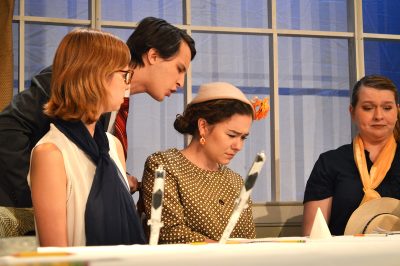
“Twelve Angry Jurors,” or “12 Angry Men” originally, is a classic in American theatre` with its most famous versions all having been done in the late 1950s, though as great as it is, the original play is inarguably steeped in the views and values of the time it was written in.
The all-male cast, the cause of the trial and the attitudes of the jurors are all very 1950s — so can a play like “Twelve Angry Jurors” survive in the 21st century? As it turns out, it can — in fact, it might even be one of the more crucial plays to watch nowadays.
“Twelve Angry Jurors” revolves around the 12 titular jurors, who are locked in a trial room to decide whether a teenager is guilty of stabbing and killing his father. The main tension of the play comes from differing backgrounds and personalities of the jurors, who remain nameless all throughout, which all eventually clash as they attempt to decide the fate of the would-be murderer — though initially, all but Juror Eight (Zach Triechel) agree that the teen is guilty. It’s up to Juror Eight to work through the rest of the jury’s opinions and sometimes prejudices in order to show them that maybe their choice wasn’t as easy as it seemed.
Being a 12-people character study, the success of any version of “Twelve Angry Jurors” relies heavily on its actors. While there are characters that are a bit more active than others throughout the plot, each juror is complex and well-rounded, with backgrounds that may not justify their positions on the trial but certainly provide an explanation for their points of view. In this aspect, the cast of Stage Troupe’s “Twelve Angry Jurors” performs spectacularly: with them, every single character is interesting.
While some of the jurors may seem more active in the plot — namely Jurors Eight, Ten (Evan Creedon), Three (Elliot Pope), Four (Abby Kass), Nine (Elina Kent) and Eleven (Adam DeAngelo) — all gain their time in the spotlight, and each actor uses that time to their fullest potential, revealing their particular spin on each juror. Yet while individual performances of the cast are notable, it is the instances where characters blatantly clash against each other or even react as a group that really stand out.
Creedon and Pope do a great job making Jurors Ten and Three the general conflict creators, and Triechel’s Juror Eight, along with Kent and DeAngelo’s Jurors Nine and Eleven, are even better as their diametric opposites. The anger and energy as each of the jurors stand their ground to defend their opinions are almost palpable, making for one of the tensest theatre experiences possible — though that’s what makes it so good.
Plot-wise, aside from obvious cast changes, nothing else has been changed from its original 1950’s version — everything remains now as it has then, no random modernizations. Yet nothing really needed to be changed. Any of Juror Ten’s monologues on how it’s always “us versus them” and knowing “how they think” could be (and even sometimes have) easily been heard over and again today — just as much as how the rest of the jury’s reaction to these monologues can still hold true.
Juror Eleven, in this aspect, is particularly quotable. His constant reminders of American democracy and how it should work has brought back concepts repeated over and again recently — or as Juror Eight puts it, “maybe we shouldn’t mind taking a few tips from those who come running here. Maybe they know something we don’t know. We’re not so perfect.”
In short, thanks to the sheer talent of those onstage, the message of “Twelve Angry Jurors” is given a special sort of gravitas in this day and age. Its messages will probably resonate better with current audiences than it would have years ago — in no small part due to the current socio-political climate — and Stage Troupe’s actors do an amazing job in sending them.



















































































































